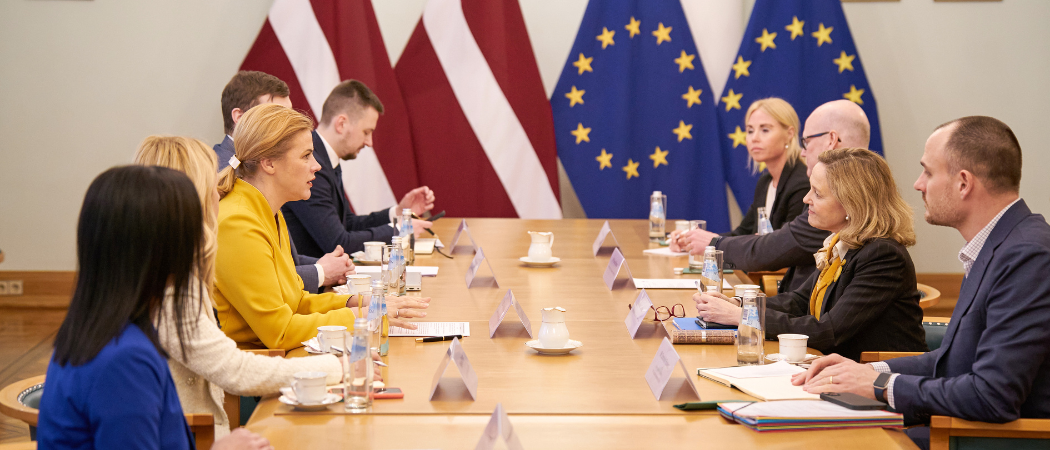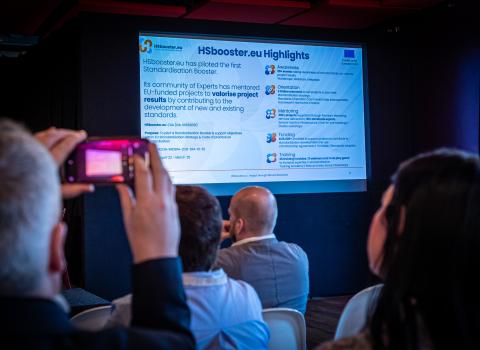The bank wants to stimulate and strengthen capital markets in the Baltic states, beginning with new offices in Riga and Tallinn. The move is expected to increase access to scale-up funding for high tech start-ups

Meeting between EIB president Nadia Calviño (right centre) and Latvian Prime Minister Evika Siliņa (left centre) to announce the opening of a new EIB office in Riga. Photo: Valsta Kanceleja / State Chancellery
The European Investment Bank (EIB) is strengthening its presence in the Baltic countries with offices opening this year in Riga and Tallinn. It also hopes to extend the reach of its existing regional office in Vilnius and make closer connections with financial institutions and companies in Latvia and Estonia.
The move is expected to enhance support for high-tech start-ups in the region, both directly and by attracting venture capital and other private investment.
As the lending arm of the EU, EIB offers loans to both public and private organisations and guarantees and equity investments that support EU priorities, such as climate action, sustainability, cohesion, and innovation. Investments in SMEs, including private debt, venture capital and equity funds are managed by the bank’s European Investment Fund (EIF).
“Being closer to the businesses which are in need of financing helps us to explain and offer our solutions,” said Virginija Gecaite, head of the EIB Group office for the Baltic states. “That has helped us to optimise our impact, and we expect the same to happen in Latvia and Estonia.”
The ultimate goal is to catalyse capital markets in the Baltic, which despite the dynamism seen in certain parts of the region’s economy remain relatively shallow. “The Baltics are classified as frontier markets from the capital markets point of view, and we do need to crowd-in investors,” Gecaite said.
When the EIB started promoting securitisation in Poland, in 2006 there were no investors willing to take on securitised assets and sell them on. Since then, the bank has signed over 20 agreements. “EIB was the first to invest, and now we are nearly at the point where we are crowding out investors rather than crowding them in,” Gecaite said. “And we want to achieve the same effect in the Baltic region.”
However, the Baltic region will require a different approach. “We cannot replicate a Polish market in the Baltics, because the size of the market is different,” Gecaite said. Securitisation is only useful to banks and other financial institutions that have reached a significant portfolio volume. That can work in the Baltics if the entity in question operates across the whole region, but only a few meet that requirement.
These include Luminor Bank, headquartered in Estonia, and AS Citadele banka, headquartered in Latvia, with which the EIB has already concluded securitisation agreements in the past few years. These are already providing much-needed finance to SMEs, and EIB hopes to build on this.
“To facilitate higher lending volumes, EIF can provide eligible alternative lenders with portfolio guarantees, so that the risk of their loan book is reduced. This releases the capital associated with the guaranteed exposures, which in turn allows lending volumes to be increased,” Gecaite said. “For portfolio guarantees, we can take smaller tickets and that suits the Baltic market much better, given the size of the financial intermediaries.”
Examples of recent portfolio guarantees include PayRay Bank, SME Bank and Mano Bankas, all in Lithuania.
The EIB can also tailor its instruments to fit local needs. “We have a minimum ticket size, below which we don’t invest, but we can adjust this threshold to a certain extent according to the region,” Gecaite said. “We understand that the banks may not be the same size and our counterparties have different balance sheets compared to central or western Europe.”
The bank’s approach is not expected to be very different in the individual Baltic countries. “The region is quite homogeneous, with overlapping strategic goals, but the three different jurisdictions remain,” Gecaite said. “Being closer will mean that we have better access to the market in each country.”
Track record
There is already significant activity to build on. EIF’s Baltic Innovation Fund (BIF) dates back to 2012, with a first iteration putting €130 million into local investment funds offering support to SMEs with high growth potential. The second Baltic Innovation Fund, launched in 2019, has €156 million to invest, and is still open.
“BIF 1 and 2 are mobilising over €1 billion of resources for SMEs in the Baltics,” said Gecaite. “These resources combine public funds and a healthy dose of private investment, which is the litmus test of any financial ecosystem.”
Since the start of the BIF initiative, 14 local private equity and venture capital funds have benefited from its support, with the overall capital raised for equity investments exceeding €1.14 billion. As of the fourth quarter of 2023, the funds supported have invested in 128 companies.
A third round will follow this year, although the investment capacity has yet to finalised. “The objective for BIF3 is to have it operational before year-end 2024,” Gecaite said.
Innovative start-ups in the Baltic region that have received support from equity and venture debt funds backed by the EIB include Aerones in Latvia, which builds robots for wind turbine maintenance; Trafi in Lithuania, a developer of urban mobility software; and 3D model marketplace CG Trader in Lithuania.
Even though the EIB cannot fund early-stage start-ups directly it is able to connect them with partners who can help. “We explain what we can and cannot do, and why we cannot engage with them directly,” Gecaite said. “It is important to EIB’s brand that we have access to both the key players on the market, and to the smaller communities as well.”
Gecaite also keeps an eye on companies from the Baltic region coming through the European Innovation Council Accelerator programme; it’s the EIB that vets equity requests and provides investment to start-ups that are successful. Biotechnology appears to be a particular strength in emerging companies, along with Industry 4.0, artificial intelligence and space technology.
“We can see that they are progressing, and will eventually reach a growth stage where we can consider financing them directly,” Gecaite said, while emphasising that the EIB does not favour any one sector over another. “We evaluate each project on a case-by-case basis, and encourage all businesses to apply.”
The first hurdle that applicants have to get over is size. The EIB will think about direct investment once a company has raised capital once or twice already, and has the organisational structure and procedures to put it on a sound investment footing. Reaching that point is more challenging in the Baltics than in other parts of western Europe, although support from local venture funds and alternative lenders is helping, as are grants and investments from the EIC Accelerator.
Then companies have to line up with the EU’s strategic priorities, such as supporting the green transition and the development of a circular economy.
“Over the years, we’ve established ourselves as a climate bank, and that will not change,” said Gecaite. “Last year we invested more than 50% of our funds in projects oriented to the green transition, but we also want to establish EIB’s brand to the same level in innovation, in digitalisation and our other priority areas.”
The EIB has already made some notable investments in Baltic deep-tech start-ups, such as energy storage innovator Skeleton Technologies, robot delivery company Starship Technologies, and biotech company Icosagen, all in Estonia. Investments have also gone to older tech companies, such as internet-of-things developer Teltonika IoT group in Lithuania, and electronics manufacturing company HansaMatrix in Latvia.
Gecaite hopes to see more direct investments in the future. “But it takes two to tango,” she said. “Companies have to be really innovative. We get a lot of applications, but there are also a lot of rejections because, in our view, the projects are not innovative enough, not cutting edge.”
Elsewhere in the Ecosystem…
- Lithuanian start-up Blackswan Space has raised €760,000 in pre-seed funding to further develop its orbital management systems. These include a mission design simulator and a navigation system that allows spacecraft to perform autonomous manoeuvres when control from the ground is not possible. The funding round was led by Scale Wolf, a hybrid accelerator and venture capital fund for defence tech, with participation from Linas Sargautis, co-founder of Lithuanian small satellite manufacturer and operator NanoAvionics, Lemonade Stand, Baltic Sandbox Ventures, and angel investor Vladas Lašas. The company, which was founded in 2019, will use the money to expand its engineering staff, accelerate product development and scale-up commercial activities.
- Bulgarian-born Stefan Dobrev will be the next chair of the European Institute of Innovation and Technology (EIT) governing board. He will succeed Nektarios Tavernarakis on 1 July. Long based in Switzerland, Dobrev is currently global head of plant-based products for dairy group Emmi, having also held senior roles in Müller and Nestlé. He also founded and launched the start-up Plantopia, and was a cofounder of the MassChallenge Switzerland accelerator.
- The European Investment Fund has launched a mentorship programme designed to promote gender diversity in the European private equity ecosystem. The Empowering Equity Mentorship Programme will provide a forum for interactions between up-and-coming female investors and more experienced women mentors already active in venture capital, private equity and private credit. Initially involving six mentors, the programme is expected to grow if the pilot phase is successful.
- Polish robotics company Nomagic has received an €8 million loan from the European Investment Bank to accelerate its R&D. Founded in 2017, the company has developed artificial intelligence systems that allow robotic arms deployed in warehouses to handle a diverse array of goods without product-specific instructions.





 A unique international forum for public research organisations and companies to connect their external engagement with strategic interests around their R&D system.
A unique international forum for public research organisations and companies to connect their external engagement with strategic interests around their R&D system.